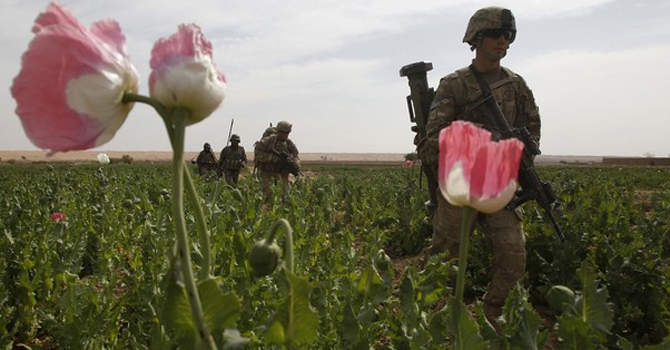KANDAHAR: It is the start of Afghanistan's poppy season and at Kandahar bus station thousands of men and boys, some as young as 10, are gathered to seek work harvesting the opium crop.
Landowner Abdul Rahman travelled from his village in neighbouring Helmand province looking for workers to help him in the short harvest season. He has 10 recruits already and is looking for another 10.
“I own 50 hectares of land in my village in Khaneshin district and have cultivated them all with poppy,” he said.
Two-thirds of the income from his fields will go to local Taliban militants in the form of protection money, but he says he will still be left with $10,000-$15,000 depending on the price of opium on local and foreign markets.
“Where else can I make this amount of money?” he says.
Over a decade after a US-led invasion drove the Taliban from power, Afghanistan produces 90 per cent of the world's illegal opium, funding much of the militia's insurgency despite an expensive Western eradication programme.
The war-ravaged country produced 5,800 tonnes of opium in 2011, up from 3,600 tonnes the previous year, according to a UN report released in January, with Helmand alone accounting for 60 per cent of the world's opium production.
On Saturday at Kandahar's huge bus station, a crowd of up to 2,000 men and boys wait to make the lucrative journey to Helmand to join in “neishtar”.
Neishtar is a Persian word for the small lance used to make incisions on the poppy plants to let out the resin, which dries into solid opium residue.
Neishtar season lasts just 15 to 20 days each April, when the weather is perfect, and every year villagers from across southern Afghanistan travel to work in Helmand's vast poppy fields, earning up to 40,000 Afghanis for their work.
“I am happy I can go to Helmand and make a lot of money,” says Lalai, a smiling 20-year-old from neighbouring Uruzgan province.
“This is the only time of the year when we can make a lot of money in such a short time.”
And while there are police check posts, the poppy landlords who converge on the bus station to pick up their recruits hardly seem concerned.
A police officer, speaking to AFP on condition of anonymity, said: “We are aware why these people are going to Helmand and we even know that some of them are Taliban fighters who have temporarily laid down arms to work on poppy fields.
“But we cannot detain them as they will simply deny the charges and accuse us of bothering them for no reason.”
In Helmand, the governor's spokesman, Daud Ahmadi, confirms the influx of people trying to reach poppy fields but says the local government is determined to stop them and says there will be no leniency for anyone breaking the law.
“We have witnessed a considerable surge for the past week in the number of people coming to work illegally and mainly on poppy fields here in Helmand,” he said.
“We have arrested hundreds of them and have either repatriated them back to their provinces or tasked them with clearing the poppy fields.”
Ahmadi had a stark warning for anyone planning to work on the opium poppy fields: “This practice is a crime; we will punish anyone who tries to break the law.”
But in a country where corruption is rampant even among higher-ranking officials, the proceeds from poppies not only fill the Taliban's pockets—they also lure local law-enforcement officers.
“We are not afraid of the police,” said a 20-year-old harvest recruit boarding a bus to Helmand.
“If they (the police) get us, we can easily get rid of them by paying 1,000 or 2,000 Afghanis.”













































